

Lo que Mary Beard nos enseñó sobre la misoginia clásica (y la actual) Mary Beard · The Public Voice of Women · LRB 20 March 2014. I want to start very near the beginning of the tradition of Western literature, and its first recorded example of a man telling a woman to ‘shut up’; telling her that her voice was not to be heard in public.

I’m thinking of a moment immortalised at the start of the Odyssey. We tend now to think of the Odyssey as the story of Odysseus and the adventures and scrapes he had returning home after the Trojan War – while for decades Penelope loyally waited for him, fending off the suitors who were pressing for her hand.[1]1 But the Odyssey is just as much the story of Telemachus, the son of Odysseus and Penelope; the story of his growing up; how over the course of the poem he matures from boy to man. Women & Power: A Manifesto by Mary Beard – review. This book is a mere slip of a thing: at 115 pages, small enough to fit into the most diminutive of bags or even (should you be in striding out mood) the pocket of an overcoat.

But size, in this instance, is irrelevant. There are two things you need to know about it. Woman as a Force in History. Mary Beard 1946. Propuestas para educar en igualdad de género desde la Educación Infantil y Primaria. Estudios de Mujeres y Género en la Antigüedad – Radio CEPOAT: El canal de la Historia. La magia de los cadáveres: necromancia en la Antigua Roma — Nocturnis Web de Terror. E_20171129 Bimilenario Tito Livio - Info - UPV/EHU. Tito Livio. Diotima: Women & Gender in the Ancient World. Call for Collaborators to The On-line Companion to The Worlds of Roman Women The On-Line Companion to the Focus Reader, The Worlds of Roman Women, expands the book's wide representation of Latin texts by and about women dating from the earliest periods through the fourth century CE.
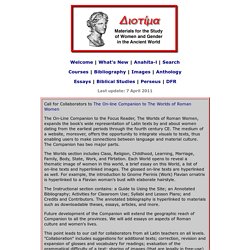
The medium of a website, moreover, offers the opportunity to integrate visuals to texts, thus enabling users to make connections between language and material culture. The Companion has two major parts. Diotima. (reprinted with permission of journal and author from ELECTRONIC ANTIQUITY, Vol. 4 Issue 1 - August 1997) Ambiguity and the Female Warrior: Vergil's Camilla Trudy Harrington Becker Classical Studies Program, Center for Interdisciplinary Studies, Virginia Tech, Blacksburg, Virginia 24061-0227, U.S.A. e-mail: thbecker@vt.edu.
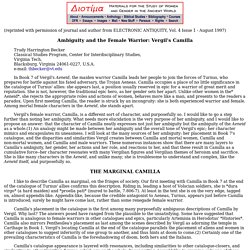
15 Interesting Women of Ancient Rome. History Women in ancient Rome were not allowed any direct role in politics.
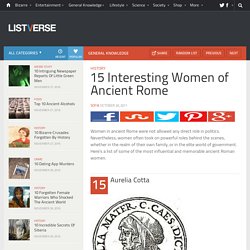
Nevertheless, women often took on powerful roles behind the scenes, whether in the realm of their own family, or in the elite world of government. Here’s a list of some of the most influential and memorable ancient Roman women. Aurelia Cotta, who lived from 120 to 54 BC, was the mother of Julius Caesar. Her husband died young, and before that, was away most of the time, so she was the one in charge of raising Caesar along with his two sisters (both named Julia – one the future grandmother of Augustus).
Hortensia (orator) - Wikipedia. Little is known about the life of Hortensia aside from her career as an orator.
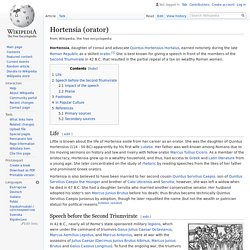
She was the daughter of Quintus Hortensius (114 - 50 BC) apparently by his first wife Lutatia. Her father was well-known among Romans due to his moving sermons on history and law and rivalry with fellow orator Marcus Tullius Cicero. As a member of the aristocracy, Hortensia grew up in a wealthy household, and thus, had access to Greek and Latin literature from a young age. She later concentrated on the study of rhetoric by reading speeches from the likes of her father and prominent Greek orators. The angry matrons, led by Hortensia, address the triumvirs. Encyclopedia of Women in the Ancient World - Joyce E. Salisbury. WLGR. Public Life 176.
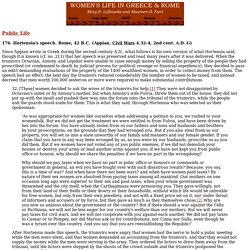
Hortensia's speech. Carthago-Delenda-Est, Badass Roman women: Hortensia the Orator. Hortensia – fl. 42 BCE – Rome – Rebel Women Embroidery. Hortensia was celebrated in the final years of the Roman Republic for her oration (public speaking) and in particular an impassioned speech she gave before the three most important men of her generation.

Public oratory was central to the life of a Roman citizen. Careers were built and destroyed based on a politician’s ability to speak in public and persuade the people with eloquence and reason. Courts of law held rhetoric in high esteem, and having a lawyer who could speak well was often more important than evidence and justice. Hortensia’s father, Quintus Hortensius, was a highly skilled orator, and rival to Cicero, the greatest speaker of the time.
Notable Women of the Roman Republic: Hortensia. Hortensia was the daughter of Quintus Hortensius Hortalus, 114 BC to 56 BC.
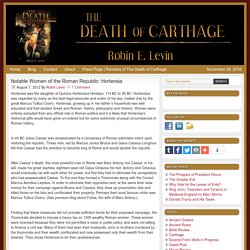
Hortensius was regarded by many as the best legal advocate and orator of his day, rivaled only by the great Marcus Tullius Cicero. Hortensia, growing up in her father’s household was well educated and had studied Greek and Roman history, philosophy and rhetoric. The Women of Pliny's Letters - Jo-Ann Shelton.